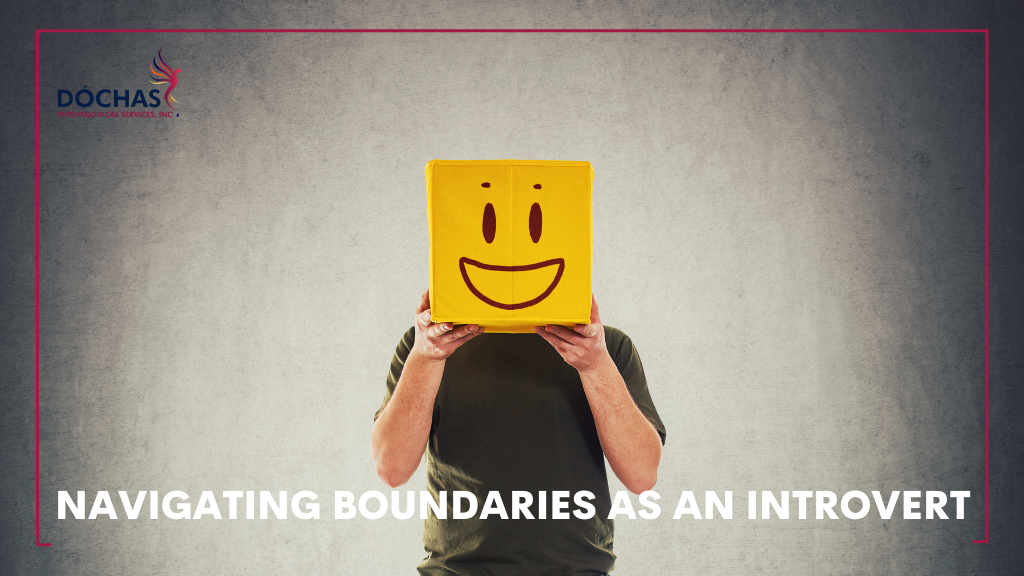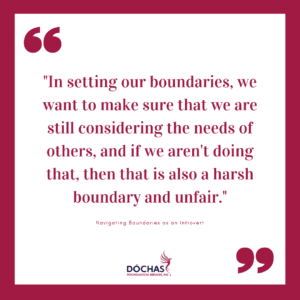“Tips and Tricks for Saying ‘No’ without Feeling Guilty.”
Hey there, it’s Kim here on the Dóchas blog. Do you ever struggle with the people that you care about wanting to go out and do things, and you just really don’t want to? But then, you don’t know if you’re being a Debbie Downer or just in general being unfair. Then, this is the blog for you! I’m going to talk about navigating boundaries as an introvert.
So let’s get into it. Read on or watch the video:
Navigating Boundaries as an Introvert
It can feel overwhelming when you spend a lot of time with extroverted people. It is difficult to determine whether or not asserting your boundaries feels too harsh if you are classically an introvert. Personally, I’m more on the introversion end of the scale than the extroversion. Some of the most important people in my life find it hard to understand because I seem to be much more extroverted! So many people in my life are extroverted, and maybe they assume that I follow suit. Much to everyone’s surprise, I’m an introvert! It’s all about knowing your limit, and I’ve learned how to navigate in an extroverted world.
For example, one way I have learned to navigate this is I have been clear with all of the people that are important in my life that I will tend to have an emotional response first when it comes to social situations. It tends to be a knee-jerk no. I’ve asked them to give me space to think about it first before giving a clear answer, and then I’m able to engage in a discussion about it.
Maybe you are still trying to figure out how to navigate your boundaries—so keep reading, and let’s talk about some steps.
Determining if your boundaries are too harsh
How do I know if my boundaries are too harsh? An indicator of this would be I was not being incremental in setting my limits on that. So, what does that mean? My first limit would be, “Please understand that I will not want to do it right away, so please give me time to think about it.” That’s my first limit.
But if I just came out with a, “Heck no, never doing that, don’t ever ask me again.” That comes across as really harsh and would be very surprising to the other person because they don’t know the backstory.
Stepping into boundaries
When you are first setting a boundary, particularly around social situations for introversion, you want to step the people that are important in your life into it. You don’t want to surprise them. First, walk them through the things that start to make you feel uncomfortable, and that way, they can work with you without getting defensive.
That ties in with the second indicator that your boundaries may be too harsh—that people stop calling, or you stop calling people, and your social circle shrinks and shrinks and shrinks. Now, this is different than our social circle shrinking because we figure things out and we figure out who we align with, people who resonate with our values. As we get older, we are more picky in our relationships. So, this is different than that. This is where you have your group of people that you really love and resonate with, but slowly you see that eroding because the limits you’re setting are too harsh.
Consider the needs of others
This ties into another indicator. It’s weird how they’re all connected! If you aren’t considering the needs of others in setting your boundary, your boundary might be too harsh. This doesn’t mean you roll over, and say, “Of course, we’ll do whatever you wanna do.” What you’re looking for is a discussion, a negotiation where some of your needs are met and some of their needs are met. And that involves insight, awareness, open and honest communication where you don’t feel like you’re surrendering and being way too vulnerable and not receiving any vulnerability in return and where the other person feels safe to do the same.
In setting our boundaries, we want to make sure that we are still considering the needs of others, and if we aren’t doing that, then that is also a harsh boundary and unfair.
What are my intentions for this boundary?
Finally, the last sign that I try to use is to try to discern my intention behind my boundary. Again this involves slowing down, being aware, letting people know right off the bat that I am aware that I’m going to have an emotional reaction first, I won’t be in my right mind because it feels like a huge threat. Let me come back to the right mind so that I can figure out what my intention is in setting this limit. My boundary might be too harsh if I am unclear about my intention.
If my intention by setting the boundary is to avoid—if it’s an avoidance thing and giving in to fear, then my boundaries are probably unfair or too harsh.b Because that’s me avoiding doing my own work just for the sake of making life easier. So, what I need to do is recognize when I am avoiding or afraid, and communicate that to the other person so that they can either support me or they can give me more space to set some other limits around it where I’m still engaging in the activity while also feeling safe and acknowledging my needs within it.
Be clear in your intention
I am clear about what my intention is by setting the boundary. If my intention is genuine and recognize that this situation doesn’t fit my values, then that’s one thing. However, as I said, if the intention is avoidance or fear-based, then that invites further dialogue with the person that is inviting you to do the thing.
You can still honour yourself while honouring someone else! So, just to sum it all up, if you are more on the introversion end when you are dealing with an extrovert in a social situation, your boundary may be too harsh if:
- You are not incrementally setting it, meaning baby steps toward the big boundary
- If you notice too many of your relationships are eroding
- If you aren’t considering the needs of others
- If you are unclear about your intention—if it’s actually about avoidance or fear rather than a genuine limit around this doesn’t align with who I am as a person.
So, give it a shot, good luck! As always, if you have any questions, please let us know. I’m more than happy to try to answer them! And just listen to yourself! You know yourself and be honest with yourself. And from there, just have a great conversation. They’re your friends because they care about you.
In most situations, they will try to understand or at least guide you through your fear.
Here are some great resources about navigating boundaries as an introvert that you should consider checking out:
- https://greenwoodcounselingcenter.com/healthy-boundaries
- https://www.psychologytoday.com/ca/blog/here-we-are/202108/when-boundaries-backfire
- https://beyondbitchy.com/podcast/49-quick-tips-5-4-signs-your-boundaries-may-be-too-harsh/
I encourage you to reach out and ask us how we can help. You can reach out to us here by calling us at 780 446 0300 or emailing info@dochaspsych.com. And as always, take care of yourself!
About Dóchas Psychological
Dóchas Psychological Services is a well-established and trusted therapy clinic located in Spruce Grove, Alberta. At Dóchas we value the idea that everyone deserves a safe space. Through connection and education, our team works hard to build a trustworthy relationship with each of our clients. It is our goal to create a community for our clients to feel like they belong.
Disclaimer
Information provided through Dóchas Psychological Services blogs or vlogs is meant for educational purposes only. They are NOT medical or mental health advice. You can read more about our disclaimer here.



